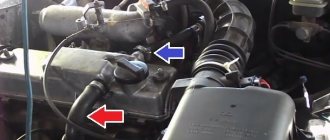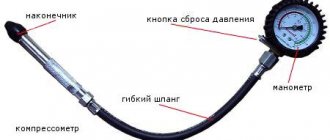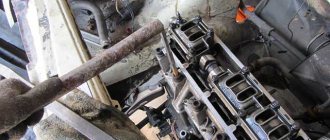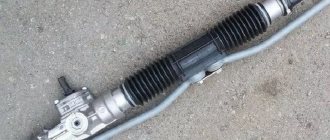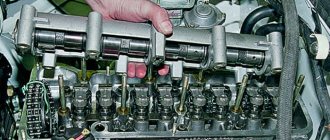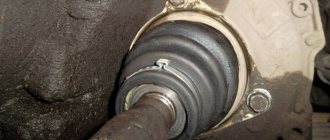Smooth and uninterrupted operation of the engine is the surest sign of the “health” of the car and its proper maintenance. Any extraneous sound, be it a creaking, knocking, hum or dull knocks, usually indicates problems in the engine. Today we want to talk about why engine valves can knock
.
Most common problem
engine valve knocking
is perhaps the most common problem that every motorist has encountered. In second place after valve knocking is the problem when the engine is shaking, but we will leave this issue for the next article, and now we’ll try to understand the reasons for valve knocking.
This problem occurs, as a rule, on the engines of cars with decent mileage or on those power units that are not properly maintained and are constantly subjected to extreme loads. However, there are also situations when the valve
They also begin to act up in new cars that are under warranty.
What is the cause of valve knocking?
The main reason why the valve
may begin to make extraneous sounds - this is an increased gap between the cams and the camshaft levers, as a result of which the cam begins
to knock
on the rocker, making extraneous sounds reminiscent of a metallic clatter.
And the larger this gap, the greater the damage will be, which will accelerate the wear of parts and ultimately can lead to complete engine
failure.
It should be noted that the gap size is set by the manufacturer, and this parameter is the same for all power units of a particular car brand, but is different from the gap in engines of other car brands. The gap must be a certain size - no more and no less than the parameters specified by the manufacturer. A discrepancy between the gap size and the smaller side will lead to the fact that the valve will be excessively clamped, and over time, for this reason, will no longer close tightly.
Stiff or incompletely closed valves
may cause
engine
and decreased compression. Among other things, you should not lose sight of the fact that for the same reason one or more cylinders may completely fail. To prevent this from happening, experts recommend adjusting the gaps in a timely manner. Adjustment periods regulated by manufacturers vary from 10 to 15 thousand kilometers.
What else can cause valve knocking?
In addition to improper adjustment, the cause of valve knocking can be detonation of the power unit. When the engine detonates, something like an explosion occurs inside it, from which a wave emanates, hitting both the cylinder walls and other parts included in the piston group. From such valve
they can also
knock
, although a metallic clattering sound from under the hood can also be heard for another reason.
Characteristic signs of engine
:
- exhaust black or other uncharacteristic color;
- increased vibration;
- motor overheating;
- reduction in power.
Causes of valve knocking on a hot engine:
- engine operation at high speeds with insufficient oil pressure;
- increased gaps (we already mentioned this at the beginning of our article);
- Excessive wear or damage to parts.
How to determine the specific cause of a knock?
In order to accurately determine which of the above reasons the valves
, it is necessary to check the condition of not only the intake, but also the exhaust valves
of the engine,
and the first step is to ensure normal engine oil pressure, and in addition, check its characteristics - viscosity, lubricating properties. When valve knocking occurs on a cold engine, the cause is most likely due to wear on the tappet. When the tappets are dirty or leaking, it is quite possible that there is insufficient oil supply to the valves. That is why at idle speed, while the engine is warming up, you can hear a metallic clatter.
If the oil pressure is normal, it is worth checking the gaps; they may need to be adjusted, which is usually done using special feeler gauges. If the camshaft is at the bottom, the probes are inserted into the slot located between the rocker arm and the upper edge of the rod. When the camshaft is at the top, the dipstick is passed between the cam and the pusher.
It also happens that, having tried all the options to eliminate the knocking, it is not possible to get rid of it in garage conditions, and the valves continue to knock.
In this case, the best decision would be to contact a service station, otherwise you can simply “kill” the engine.
As you all know very well, nothing can work constantly. No matter how sad it may sound, there will come a time when you will need to take your vehicle to a service station to diagnose all kinds of faults. There are very complex breakdowns that cannot be repaired with your own hands. But there are also problems that you can fix in your garage yourself. For example, the knocking of valves is the middle. Sometimes you can fix the problem yourself, but sometimes you can’t fix it without the help of a specialist.
How can you determine if the valves are knocking?
For new motorists, at first it will be very difficult to understand why the noise occurs. Third-party sounds are formed in such cases if the following breaks down:
1. Belt
2. Bearing
3. Crankshaft
4. Valves
The valves produce a very clear, perceptible sound, as if tapping metal near the gas distribution mechanism (timing mechanism). One of the features is the consistency of the knock, both at low power and at high speeds. Of course, for a driver without skills, relying only on hearing, it is actually not possible to determine valve failure. You can do the diagnostics yourself:
1. You need to open the hood, then the hole with the plug for filling the oil. Leave your vehicle running and listen carefully. If it seems to you that the noise is increasing, then the valve is still faulty.
2. You can also install a stethoscope next to the part that you consider to be faulty. Using this method, you can determine the source of extraneous noise.
What is the cause of valve knocking
Modern vehicles are equipped with a camshaft. It is located on top. The valve is driven by a rod, otherwise called a “Pusher”. The valve makes a tapping sound for some reason. Let's look at each in turn:
1. Almost all motorists know that there is a certain distance between the rod and the valve, which is calculated by vehicle manufacturers. If there is a decrease or increase in space, a loud sound with metal tapping occurs.
2. With constant use of low-quality oil, engine detonation occurs.
3. If there is a knocking sound while driving at high speeds or during acceleration, this may indicate a lack of oil pressure to increase engine power.
4. The timing belt is not installed correctly or is stretched.
5. An important reason is wear and tear. Each part needs to be replaced after some time.
Let's sum it up
The appearance of valve knocking indicates the need to quickly solve this problem. In addition to increasing the gap, the causes of increased noise may be:
- worn camshaft cams;
- broken valve spring;
- there is a defect in the valve guide;
- the timing belt/chain has become loose;
- there is a decrease in the efficiency of lubricant supply through the camshaft channels to the valve stems;
- there were problems with fixing the camshaft;
For high-quality repairs, you will need to disassemble the engine (remove the valve cover or cylinder head), after which the camshaft and other timing elements are repaired. Let us add that timely professional adjustment of valves can significantly increase the life of the gas distribution mechanism and the internal combustion engine itself.
I adjusted the valves according to the manual and set the gap to 0.4 mm. But the car is now unrecognizable. If before there was a light tapping, now there is a specific knocking. It knocks so loudly that it's even kind of scary to drive. In short, the engine works like hell. Here you can watch the video:
Need advice! What can be done about this? How dangerous is it to drive like this?
Valve knocking on a cold engine
When conducting diagnostics, pay close attention to the engine temperature. Some factors may be present regardless of whether the valves are knocking on a hot or cold engine.
Sounds that occur on a cold engine appear for the following reasons:
1. Engine wear.
2. Narrowing of the valves. At a high enough temperature level, all metals have the ability to expand. At minimum everything is different, they decrease. Therefore, the distance from the valve to the pusher decreased, and after the engine warmed up, it reached its original state.
It follows from this that the interval from the valve to the pusher does not correspond to the corresponding standard, and at a high level of engine temperature this may remain undetected.
What actions should be taken when valves knock?
To deal with this problem there is one simple way: you need to take your favorite iron horse to the nearest service station so that a specialist can correct the problem that has arisen. There are times when there is no financial opportunity to do this, or you simply want to repair the car yourself, gaining skills. If you look at it, this case with valves will seem to some like an extraordinary puzzle in terms of repair. Which is a very erroneous opinion. After all, making one wrong move will only increase the sound. For this reason alone, a driver without skills should not try to do this. If you decide to start repairs, be sure to read the repair instructions for your vehicle.
Can valves knock due to oil?
Low oil level can cause noise in the valve system.
I can hear the crash
Problems with a hydraulic lifter (hydraulic lifter) are similar to problems with a worn valve guide or rocker arm (see following sections). A stuck, worn out or failed lift can also cause a knocking noise.
However, identifying a problem with one or more athletes can be difficult. Do these preliminary checks:
- Check that the oil level is correct.
- Examine the condition of the oil.
- Adjusting the test valve.
- Check the condition of other system components (rocker arms, pushers, springs).
If none of these components seem bad, you may be dealing with a sticking retainer.
Before you begin disassembling the valve system components, you may want to try an engine oil detergent additive if your vehicle uses hydraulic lifters. The additive can help restore the lift if it gets stuck; otherwise you may need to replace the hydraulic compensator.
The following is a description of common instructions.
· To access the valve, you must first remove the “Cylinder Block Head” plug. Be sure to drain the oil;
· Then you need to turn the camshaft so that the mark on the pulley coincides with the installation protrusion;
· The distance from the valve to the rod can be determined by feeling it yourself;
· An adjustment washer can be used to adjust the gap;
· The specific configuration of the vehicle determines how many times the puck will be operated;
· After connecting all the parts back together, check again whether there is any sound after what has been done;
If the problem recurs, take the car to a service station, for the reason that you will not be able to fix other problems not related to space. It may very well be that the adjustment was not correct.
The article describes the situation when valves knock, what the problem is and what malfunctions the appearance of such a sound may indicate. How to conduct self-diagnosis.
How can you understand why your valves are knocking?
Check the oil pressure, it should be fine, and also make sure that its condition and viscosity properties are normal.
Valves can also knock when “cold”; in this case, the reason may be critical wear of the pusher. When the tappets leak or become dirty, this can affect the flow of oil to the valves, resulting in a characteristic metallic knocking sound from a lack of lubrication in the valves.
If after checking the oil pressure is in order, you should check the valve clearances; it is possible that valve adjustment will be required.
Source: VAZ Repair
The main causes of valve knocking
Smooth engine operation without extraneous sounds often indicates timely and high-quality maintenance, in other words, its serviceability. The appearance of uncharacteristic sounds is the first signal of a malfunction. Unfortunately, the malfunction does not always manifest itself in this way. Valve knocking can be attributed to a problem that can always be determined by ear. A problem like this can signal many future problems.
Risk area
As a rule, problems of this kind occur on an engine with high mileage or a serious problem. In addition, engines that are operated under heavy loads fall into the risk zone; for example, a semi-truck is equipped with an engine that is not designed to transport a load of a certain weight. In addition, valve knocking is a common occurrence on domestically produced cars. However, there are known cases when knocking appears on a cold engine in new foreign cars. What problems can lead to such a phenomenon?
What is the problem?
No matter how far progress has gone in the field of automobile construction, the operating principle of the internal combustion engine has remained virtually unchanged, only improved. Why does valve knocking occur?
Such problems can be prevented if you determine in time whether the valves are knocking or the sound comes from other elements of the internal combustion engine.
Knock of valves on a hot VAZ 2107 engine
- To the beginning of the forum
- Forum Rules
- Old design
- FAQ
- Search
- Users
There is a suspicion that when heated it drives either the head or the camshaft bed
On a cold engine there is no knocking, or almost no knocking. When the valve is hot, the heads closest to the center begin to “sing” clearly.
The cam assembly is new, the rockers are new, the valves are new, and the guides are new too. The whole thing is only 1500 km. Old valve ball joints, old springs. Before this, the mileage was about 135 thousand. 400 km ago I stretched my head and removed the camshaft - I didn’t notice any wear anywhere. Only before the broaching, valve 2 and especially valve 1 were not adjustable, but now it has shifted to the middle. I’ve heard the opinion that just using the feeler gauge you can adjust it very precisely, since the rack allows you to indirectly estimate the gap, and the feeler gauge allows you to directly estimate it. And it is clearly clear that if the gap is small, the dipstick will not fit through. If it’s big, it will go through easily. I cut it down to a little less than the width of the rocker to make it more accurate. I will exclude the guides, since when the valves are tightened a little, the knocking disappears, and these valves did not knock before broaching. In general, the noise indicates that the gap is larger than necessary. And the noise disappears, indicating that either the gap has returned to normal or is smaller (which is bad). In my case, I am surprised that a slightly smaller gap than the required one solves the problem and the knocking disappears.
Regarding the old ball joints. When the 1st and 2nd valves knocked before pulling, I blamed them. I replaced them with new ones only for 1 and 2 - no effect. Therefore, I think the rest of the ball joints can be considered normal, since the mileage is the same for all.
There is a suspicion that when heated, either the head or the camshaft bed is driven, and this behavior causes the clearances to change. After all, it doesn’t knock when it’s cold.
The cam assembly is new, the rockers are new, the valves are new,
Source
Determining the causes of sound
Modern cars are equipped with engines in which the clearance is adjusted automatically. When looking for an answer to the question why a valve is knocking on a foreign car, the answer is most likely not in adjusting the clearance. All modern internal combustion engines are equipped with hydraulic compensators. But with domestic cars and other foreign cars that do not have a similar system, the issue of adjusting the gap is relevant. On many foreign cars, the procedure for adjusting or checking the clearance is a complex topic. As a rule, the engine should be checked for violations of the gap by specialists. On an old engine or domestic units, you can check why the valves are knocking as follows:
Other causes can only be identified through a professional inspection of the engine, or in some cases, during its disassembly.
Timing belt and valve
The timing belt can also cause valve knocking. A similar phenomenon occurs as follows:
If the tension is weak, the timing is lost, which leads to the problem under consideration. If the timing belt has slipped by one or more teeth, valve knocking will appear gradually. As a rule, it all starts with a small knock, which not many people will notice on a car older than 10 years. Over time, the sound will increase several times. Everything usually ends with a broken timing belt and all the other problems that arise in a similar situation. Therefore, extraneous sounds from the valves are something that you should pay attention to.
When the timing belt slips by one tooth, the engine receives minor damage, mainly the gas distribution system suffers. In the event of a complete break, the cylinder block, cylinders, head and other components of the engine suffer. Unfortunately, it is quite difficult to determine visually that the belt has jumped. In addition, its timely replacement is not a guarantee that a break will not occur. Licked splines and failure of the tension roller often lead to similar problems. Adjusting valves on modern internal combustion engines without hydraulic compensators is a complex process that not every dealership undertakes. This is due to the fact that it is necessary to disassemble the engine with further adjustment of the gaps. There is practically no need to change anything, only engine elements that can wear out and, if necessary, be replaced. You should also beware of service centers that begin to “talk” about the need to replace many elements and that the work takes several days.
A mechanic who knows a specific engine and has done similar work can do everything in a few hours, and adjusting the valves will cost several thousand rubles.
No matter how reliable the car is, the time comes when you are forced to go to a service station to diagnose and repair faults. At the same time, most of the breakdowns can be fixed with your own hands, but there are also those that only professionals can help fix. Valve knocking is a common problem, which in terms of difficulty of elimination is somewhere in the middle. In some cases, it is possible to identify the malfunction and make repairs on your own, while in others you have to turn to a specialist for help. Watch the video “Adjusting VAZ 2107 engine valves” below
How to diagnose a knock?
Without sufficient experience, car owners sometimes find it difficult to determine the problem by ear. This is not surprising, because the source of extraneous noise can be anything - the crankshaft, bearings, faulty belt and valves. But unlike other sounds, the knocking of valves reveals itself with a characteristic sonority, with a certain metallic tapping, near the gas distribution mechanism. In addition, unusual noise occurs regardless of engine speed.
In practice, it is not difficult to recognize that valves are knocking, but even experienced car owners sometimes fail to diagnose their malfunction. But to confirm or refute suspicions, you can make a diagnosis yourself. For this:
- Lift the hood, then unscrew the cap from the engine filler hole (through which the oil flows).
- Listen to the engine running. If the sound volume increases, the valves are causing the problem.
- Place a stethoscope near the part that you suspect is faulty. Using this device, you can accurately determine the cause of extraneous noise.
What are the reasons for the knocking?
Valve knocking can be caused by many reasons, each of which deserves special attention. Please note that all cars are equipped with a camshaft (at the top of the engine), and the operation of the valves is ensured by the elements of this unit - rods or otherwise called pushers.
So why do valves knock? Let's highlight the main reasons:
- Changing the gap between valves and pushers. When releasing the car, the distance between the rods and valves is precisely adjusted. If the parameter deviates from the norm (decrease or increase), a “metallic” tapping sound appears.
- Refueling a car with low-quality fuel. If bad fuel is used, engine detonation occurs, which causes the valves to suffer.
- Lack of oil pressure during acceleration. There are situations when valve knocking appears only when driving at high speed or during acceleration. The reason is insufficient pressure in the engine lubrication system to increase speed.
- Incorrect installation or misaligned timing belt position (how to set marks and tension the timing belt).
- Natural wear and tear. If the valves on your car are knocking, this often indicates that the part is simply worn out and needs to be replaced.
Why does valve knocking occur on a cold engine?
When checking, pay attention to one of the main parameters - engine temperature. There are situations when an extraneous sound appears only on a cold or hot engine. If you “link” valve knock to this parameter, you can draw additional conclusions. So, if an extraneous sound appears only on a cold engine, then the reasons are as follows:
- Narrowing of the valves. It is no secret that when heated, metal tends to increase in volume, and when cooled, it tends to decrease. For this reason, the distance between the valves (on a cold engine) may be small, and after the engine reaches operating temperature, it returns to the factory setting.
- Motor wear. The second reason why valves knock is wear and tear on the engine itself.
It turns out that the gap between the valves and rods does not correspond to the parameter set at the factory, but this only appears on a cold engine. Once the engine warms up, the problem disappears.
Why do valves knock on a hot engine?
If the problem continues to manifest itself after warming up, the reasons may be the following:
- Lack of oil in the tank.
- Oil filter dirty.
- Insufficient tightening of the bolts securing the camshaft to the bed.
In addition, extraneous sound can be caused not only by the knocking of valves, but also by hydraulic compensators.
Why do engine valves knock during acceleration?
The engine may knock while driving. If this happens, it is hardly possible to deal with it locally. The first thing to do is check the oil level in the power unit. Insufficient oil level may well be the cause of damage that causes the knocking noise. It is necessary to replenish the oil level to normal as soon as possible. It is likely that this simple action will help eliminate knocking in the power unit.
Then you need to find out whether the knocking occurs under load, that is, when the car is moving. Listen to how much it grows when the car accelerates. If both symptoms are present, then the likely culprit is the crankshaft bearings. You should not operate a car with such a defect, otherwise you can provoke a complete engine failure. Which will ultimately result in expensive repairs.
Often, knocking in the engine occurs due to refueling with low-quality fuel. This knock will fade over time. It is unlikely to be dangerous to the engine. If the knocking does not die out, you need to listen more carefully to the sound of the engine. The most dangerous thing is when the intensity of the knocking increases - in this case, further operation of the machine can definitely result in serious damage.
